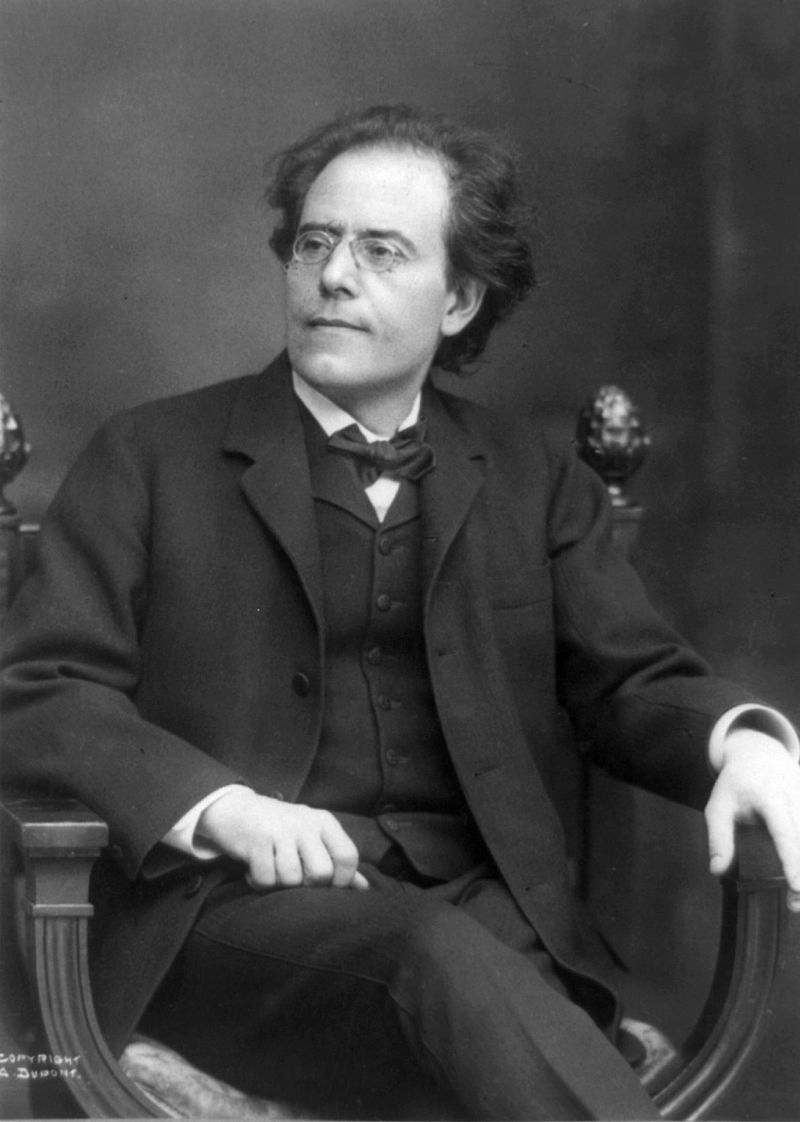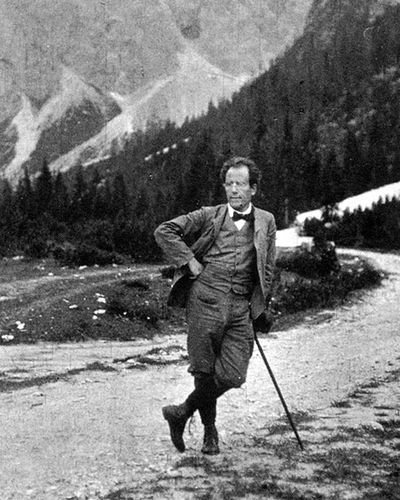Overview
Works Directory
Top Works
| Mahler: Symphony no. 1 in D major "Titan" | Composer | 1884-1888 | |
| Mahler: Symphony no. 5 in C-sharp minor | Composer | 1902-1911 | |
| Mahler: Symphony no. 3 in D minor | Composer | 1896 | |
| Mahler: Symphony no. 2 “Resurrection” | Composer | 1888-1894 | |
| Mahler: Symphony no. 8 “Symphony of a Thousand” | Composer | 1906–1907 | |
| Mahler: Das Lied von der Erde | Composer | 1908-1909 | |
| Mahler: Symphony No.6 in A minor ("Tragic") | Composer | 1903-1904 | |
| Mahler: Symphony no. 4 in G major | Composer | 1899-1900 | |
| Mahler: Symphony No. 9 in D major | Composer | 1909-1910 | |
| Mahler: Lieder eines fahrenden Gesellen | Songwriter | 1883-1885 | |
| Mahler: Symphony no. 7 in E minor "Lied der Nacht" | Composer | 1904-1906 | |
| Mahler: Lieder aus "Des Knaben Wunderhorn" | Composer | 1887-1901 | |
| Mahler: Das klagende Lied | Composer | 1878-1880 | rev. 1892-93, 1898-99 |
| Mahler: Three Lieder: "Im Lenz"; "Winterlied"; "Maitanz im Grünen" | Composer | 1880 | |
| Mahler: Kindertotenlieder | Composer | 1901-1904 | |
| Mahler: Symphony no. 10 in F-sharp major (unfinished) | Composer | 1910 |
Photos
Biography
Gustav Mahler (7 July 1860 – 18 May 1911) was an Austrian late-Romantic composer, and one of the leading conductors of his generation. As a composer he acted as a bridge between the 19th century Austro-German tradition and the modernism of the early 20th century. While in his lifetime his status as a conductor was established beyond question, his own music gained wide popularity only after periods of relative neglect which included a ban on its performance in much of Europe during the Nazi era. After 1945 his compositions were rediscovered and championed by a new generation of listeners; Mahler then became one of the most frequently performed and recorded of all composers, a position he has sustained into the 21st century.
Born in humble circumstances, Mahler displayed his musical gifts at an early age. After graduating from the Vienna Conservatory in 1878, he held a succession of conducting posts of rising importance in the opera houses of Europe, culminating in his appointment in 1897 as director of the Vienna Court Opera (Hofoper). During his ten years in Vienna, Mahler—who had converted to Catholicism to secure the post—experienced regular opposition and hostility from the anti-Semitic press. Nevertheless, his innovative productions and insistence on the highest performance standards ensured his reputation as one of the greatest of opera conductors, particularly as an interpreter of the stage works of Wagner and Mozart. Late in his life he was briefly director of New York's Metropolitan Opera and the New York Philharmonic.
Mahler's œuvre is relatively small; for much of his life composing was necessarily a part-time activity while he earned his living as a conductor. Aside from early works such as a movement from a piano quartet composed when he was a student in Vienna, Mahler's works are designed for large orchestral forces, symphonic choruses and operatic soloists. Most of his twelve symphonic scores are very large-scale works, often employing vocal soloists and choruses in addition to augmented orchestral forces. These works were often controversial when first performed, and several were slow to receive critical and popular approval; exceptions included his Symphony No. 2, Symphony No. 3, and the triumphant premiere of his Eighth Symphony in 1910. Some of Mahler's immediate musical successors included the composers of the Second Viennese School, notably Arnold Schoenberg, Alban Berg and Anton Webern. Dmitri Shostakovich and Benjamin Britten are among later 20th-century composers who admired and were influenced by Mahler. The International Gustav Mahler Institute was established in 1955 to honour the composer's life and work.
Having lived a divided life of triumph and heartbreak, of optimism and hopelessness, it is only fitting that the music of Gustav Mahler portrays such conflict and arouses varying reactions in listeners, from fierce adoration to outright dislike.
Mahler was born on July 7, 1860, in Kalischt, Bohemia, to the owners of a brandy distillery. Gustav was the second of twelve children born to Bernhard and Marie Mahler, six of whom died very young and one of whom committed suicide. Gustav did show a musical precocity and Bernhard, open to his son's talent, began paying for piano lessons. Gustav gave his first public recital in Iglau at the age of ten, before finding his way to the Prague Gymnasium and Vienna Conservatory.
His conservatory period was generally a success, having won awards for piano playing and composition, but having first dealt with the anti-Semitic views of Vienna's musical establishment. Mahler chose to conduct while earning a sparse composing income, working through the smaller halls of Bohemia and Hungary before establishing himself as a podium tour de force with appointments in Prague (1885-6), Leipzig (1886-8), Budapest (1888-91), Hamburg (1891-7), and, ultimately, Vienna (1897-1901). Mahler was popular in his conducting role, leading revolutionary changes in orchestral repertoire and how opera, particularly Wagner, is presented.
The personal life of Mahler, even with its depth of success, was remarkably troubled. His harsh rehearsal methods and dealings with musicians were widely criticized, although many were fascinated by his leadership and considered his performances to be on an entirely different level. His Jewish background made him even more of a target for Vienna's racist newspapers, imposing pressure to which he later caved. He converted to Roman Catholicism while in Vienna for political reasons, overlooking his true faith. Mahler's ten-year marriage to Alma Maria Schindler barely escaped divorce, having been strained by their age difference of 19 years, his identity problems, and the death of their five-year-old elder daughter, Maria Anna. A psychoanalytical discussion about their marriage between Gustav Mahler and Freud is very well-known.
Mahler's compositional output is almost entirely of symphonies and lieder . He never wrote a complete opera, despite making such a large contribution to operatic design and presentation. Of his nine full symphonies, the Second ( Resurrection, premiered 1895), Third ( Pan, 1902), and Eighth ( Symphony of a Thousand, 1910) are arguably the most popular with listeners. His song canon is extensive, including the cycles Lieder eines fahrenden Gesellen (Songs of a Wayfarer), Kindertotenlieder (Songs on the Deaths of Children), Des Knaben Wunderhorn ( The Youth's Magic Horn), and Das Lied von der Erde (The Song of the Earth). For those who find the symphonies less appealing, the songs are easily approachable and beautiful in tone.
The style of Mahler is late-Romantic, along the lines of Anton Bruckner, Richard Wagner, and Alexander von Zemlinsky. Although tending to use the classical forms of sonata and scherzo, his themes typify the anxious fin-de-siécle mood that took hold of Europe during his era. While drawing closer to the world of New Music - atonality - he expanded the Romantic orchestra to its breaking point. His Eighth Symphony, divided into two parts on an ancient church hymn and the transfiguration scene from Goethe's Faust, requires some one thousand performers, including eight vocal soloists, adult and children's choirs, quadruple winds, two harps, large percussion section, and organ. Naturally, Mahler's commitment to new sounds and his idea of the symphony as an "entire world" were unpopular but for a small group of Viennese admirers. But the group did include Arnold Schoenberg, Alban Berg, and Anton Webern, who led the Germanic musical world through later years.
Mahler died of a blood infection in Vienna on May 18, 1911, at the age of 50. His music was seldom performed in the years immediately after his death and further set back by the Nazi's crackdown on "degenerate" music in Germany and Austria during the Second World War. Even today, Mahler's stormy works seem coarse to many and are an acquired taste. But through growing interests in Mahler's legacy, his music has seen a steady revival over the past five decades. ~ Paul-John Ramos

Index: 9.5
Type: Person Male
Period: 1860.7.7 - 1911.5.18
Age: aged 50
Area :Austria
Occupation :Composer
Periods :Romantic Music
Nation :Jew








